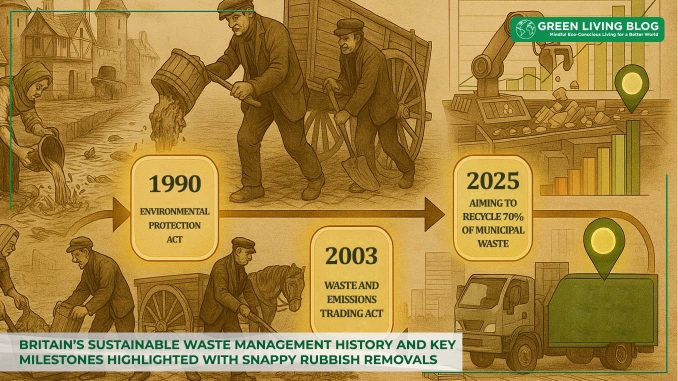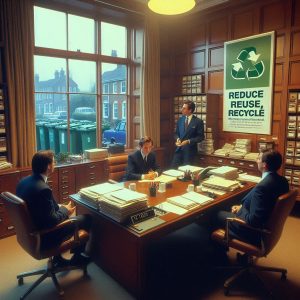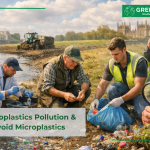
The journey towards sustainable waste management in the United Kingdom represents a vital shift from traditional disposal methods to environmentally-conscious practices that prioritise recycling, reuse, and waste reduction.
Government initiatives, public attitudes, and technological innovations have collectively fostered a more sustainable approach.
Let’s uncover the UK’s intriguing sustainability journey through its rubbish with the waste management specialists at Snappy Rubbish Removals!
Early Sustainable Waste Management Efforts during the Industrial Revolution

Initial sustainable waste management efforts date back to the late 19th and early 20th centuries, particularly in industrial cities such as Manchester and Sheffield. These cities pioneered the recycling of industrial by-products, notably metals and textiles, recognising early on the economic and environmental benefits of reusing materials.
Post-War to Modern Waste Management Sustainability
Following World War II, the UK saw a dramatic rise in waste generation due to economic recovery and consumerism. However, this era also marked the beginning of structured recycling programs, driven by resource scarcity and increasing environmental awareness. The recycling of glass, paper, and metals gained momentum, laying the foundations for modern sustainable practices.
UK Government Sustainability Policies and Initiatives

Government policies have been pivotal in advancing sustainability in waste management. The introduction of the Environmental Protection Act (1990) represented a landmark step, imposing stricter waste disposal regulations and promoting recycling.
Subsequently, initiatives such as the Waste and Emissions Trading Act (2003), the Waste Framework Directive and the Resources and Waste Strategy for England policy have furthered the UK’s commitment to sustainable waste management.
The Welsh government notably set ambitious recycling targets, aiming to recycle 70% of municipal waste by 2025, significantly influencing national strategies and motivating other regions to adopt similar targets.
Scotland’s Zero Waste Plan and its deposit-return scheme illustrate focused governmental efforts in waste reduction, fostering consumer participation in recycling.
Northern Ireland emphasises diverting waste from landfills through robust policies supporting recycling and waste-to-energy conversion.
Eco-Technologies and Innovations
Technological innovation has significantly boosted sustainable waste management processes reviewed by Snappy Rubbish Removals. Facilities for anaerobic digestion have become widespread, converting organic waste into biogas and fertilisers, effectively diverting significant volumes from landfills.
Sophisticated recycling facilities utilising advanced sorting technologies have improved the efficiency and effectiveness of material recovery processes. Waste-to-energy plants across the UK turn non-recyclable waste into energy, significantly reducing landfill use and greenhouse gas emissions.
Real-time waste tracking technology and automated sorting systems are further innovations that enhance waste management efficiency, enabling precise monitoring and optimised resource recovery.
Job Creation and New Roles in Sustainability

Sustainable waste management has created numerous specialised environmental jobs, reflecting its growth and complexity. Roles include environmental sustainability specialists, recycling operations managers, waste reduction consultants, compliance officers, and eco-technology engineers.
This expanding job sector demonstrates the economic potential and societal importance of sustainable waste management, providing career opportunities that contribute directly to environmental protection.
Impact and Future Prospects
The UK’s sustainable waste management strategies have significantly reduced pollution, minimised landfill reliance, and conserved resources. The ongoing commitment to sustainability promises further innovation, policy evolution, and increased public engagement, continuously enhancing environmental protection and public health.
Looking forward, the UK is poised to lead globally in waste sustainability, promoting circular economy principles and developing even more advanced eco-technologies to manage resources sustainably.
Britain’s Not Rubbish At Going Green
The UK’s transition to sustainable waste management showcases remarkable progress shaped by proactive policies, technological innovation, and increasing public awareness. Continued commitment ensures a resilient, environmentally responsible future, underscoring the UK’s role as a global leader in sustainable waste practices that lead the way in going green.
![]()
Author Profile

- Always on the hunt for the latest green living news, tips and stories, proudly sharing them with readers all around the world to make this planet a better place.
Latest entries
 DictionaryJanuary 19, 2026What is Microplastics Pollution & How to Avoid Microplastics
DictionaryJanuary 19, 2026What is Microplastics Pollution & How to Avoid Microplastics Green Expert GuidesJanuary 17, 2026Could going flight-free be the best decision you make this year?
Green Expert GuidesJanuary 17, 2026Could going flight-free be the best decision you make this year? Green News ReleasesJanuary 15, 2026Algae Dynamic Biotech Pilots Microalgae Fuel
Green News ReleasesJanuary 15, 2026Algae Dynamic Biotech Pilots Microalgae Fuel Green News ReleasesDecember 8, 2025Algae Dynamic Biotech Pioneers High-Efficiency Algae Fuel
Green News ReleasesDecember 8, 2025Algae Dynamic Biotech Pioneers High-Efficiency Algae Fuel





Leave a Reply
You must be logged in to post a comment.